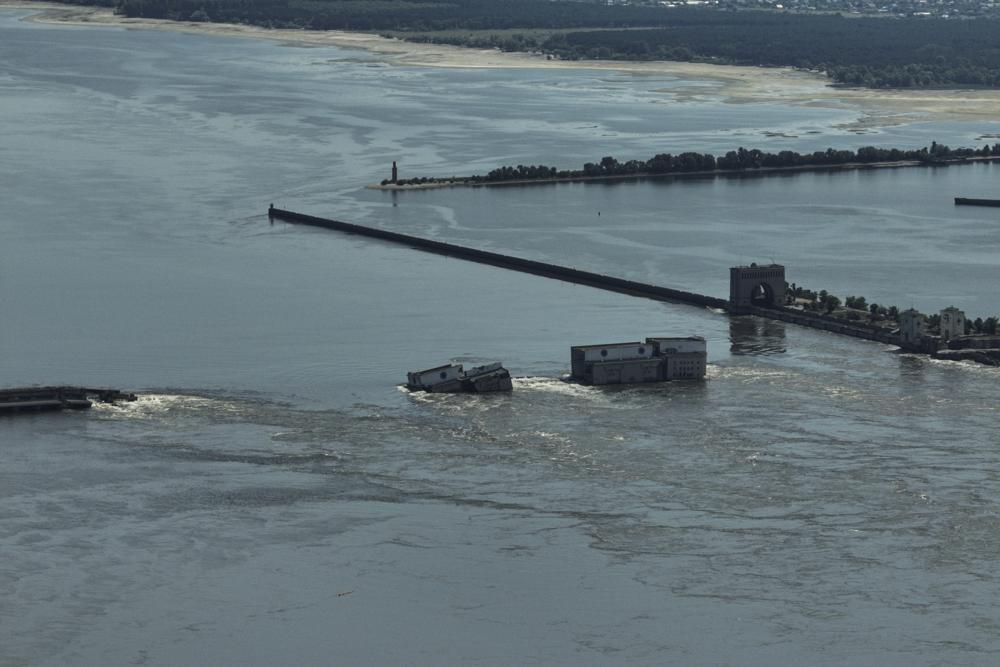Exclusive drone footage of the collapsed Ukrainian dam and surrounding villages under Russian occupation showed the ruined structure falling into the flooded river, hundreds of submerged homes, greenhouses, even a church — and no evidence of an attack from above, as Russia alleges.
An Associated Press team flew a drone over the devastation on Wednesday, a day after the destruction of the Kakhovka dam on the Dnieper River.
The bulk of the dam itself is submerged, but the parts of buildings still visible above the rushing waters had no scorch marks or shrapnel scars typical of a bombardment that Russia has accused Ukraine of carrying out.
Ukraine in turn has alleged that Russian forces, who controlled the dam, blew it up from within. The AP images offered a limited snapshot, making it difficult to categorically rule out any scenario. The dam had been weakened by months of Russian neglect and water had been washing over it for weeks.
On Wednesday, the rooftops and streets in the area were devoid of people, but AP journalists could hear the howls of dogs trapped by the flooding.
The collapse of the dam in an area that Russia has controlled for over a year and the emptying of its reservoir has irrevocably changed the landscape downstream, and shifted the dynamic of the 15-month-old war.
In the images captured by the AP, most of the dam was submerged by the rushing water. Two nearby villages under occupation, Dnipryany and Korsunka, were also underwater up to the rooftops of homes and a bright blue church. The rounded shape of dozens of greenhouses was visible over the waterline.
The nearby town of Nova Kakhovka, also under occupation, was less touched by the flooding but equally devoid of people and animals. Its Ferris wheel was stopped and water lapped up a main street.
Ukraine has warned since last October that the hydroelectric dam was mined by Russian forces, and accused them of touching off an explosion that has turned the downstream areas into a waterlogged wasteland. Russia said Ukraine hit the dam with a missile. Experts have said the structure was in disrepair, which could also have led to its collapse.
There were no signs typical of a missile attack in the few remaining buildings.
The Dnieper River forms part of the front line in the war, and many people had already fled the area because of the fighting. Ukraine holds the western bank, while Russia controls the low-lying eastern side, which is more vulnerable to flooding.
Anna Lodygina, a Nova Kakhovka resident who fled last autumn, said the flooding has paralyzed the occupied town, with markets closed, and limited electricity and mobile reception. The Russian soldiers occupying her family home, just 500 meters (yards) from the river, fled after the dam collapsed and neighbors have told her water now reaches the upper floor of the two-story building.
Friends and neighbors told her the Russians pulled out themselves, but extended no help to residents, so people took matters into their own hands, finding shelter in a neighborhood farther from the river.
According to Lodygina, the historic part of the city is submerged. “Its state now is unknown,” she said.
On the Ukrainian-controlled side, a Red Cross worker fielded calls from people begging for rescue from the other bank but could do little for them.
“Our telephone is burning up from calls and our phone number is not well known. Just yesterday we got at least 30 calls from occupied territories,” said Mykola Tarenenko, chief of the Kherson Red Cross quick response team. “People are asking us to evacuate them because no evacuation was organized.”

